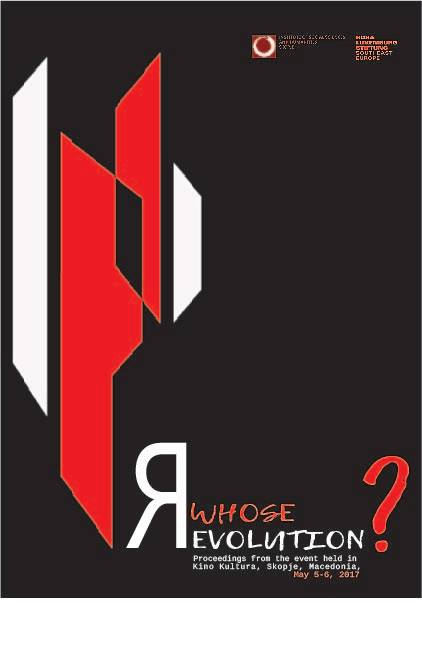
We kindly inform you that, as long as the subject affiliation of our 300.000+ articles is in progress, you might get unsufficient or no results on your third level or second level search. In this case, please broaden your search criteria.

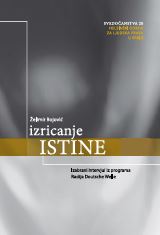
Many books have already been written about how Serbia reacted to the challenge at the beginning of the Third Millennium. In front of the reader is a book that stands out from the crowd because of who, when and what is said in it. On the airwaves of Radio Deutsche Welle, 149 intellectuals, predominantly of Serbian nationality, but also foreigners who deal with Serbia professionally, spoke in 169 interviews about the situation in Serbia mainly after October 5, 2000. By definition, the critical, individual opinion of economists, historians, doctors, diplomats, and artists rounded off the worrying picture of the whole. Speaking independently of each other, the interlocutors of Radio Deutsche Welle reveal the reality of Serbia, which is significantly different from the official reality. Marked as a peaceful revolution, as a new beginning for Serbia, as its historic chance to stop wasting time, with the undivided support of the European Union and the United States of America, October 5, 2000, when the consensual autocrat Slobodan Milošević was removed, was ambiguous. the event. Great hopes were raised; created unrealistic but explainable expectations; the apparent unity of intentions of the main actors was achieved. But, by itself, October 5, 2000 did not represent the balance of what happened in the previous 15 years, and even less a clear projection of Serbia in the future. The attempt made by Prime Minister Zoran Đinđić in this direction was brutally stopped by his murder. Legalism was the new name for the large-state project of the 1990s, which led Serbia to disaster, and the Serbian national and state issue to a dead end. The dismantling of Slobodan Milošević's regime could only occur as a consequence of discontinuity with that policy. … Collected in this book, they represent an important testimony that binds the ruling structures in Serbia. The reality cannot be ignored if there is a political will to change it and to stop the regression of Serbia.
More...
(ANOTHER SERBIA) Every Saturday for a period of two months, from the beginning of April till the end of June 1992, sessions organized by the Belgrade Circle were held at the Student Cultural Centre in Belgrade. At these sessions, ten in all, intellectuals, members of the Belgrade Circle and their quest – distinguished writers, scientists, artists, journalists, film and theatre directors, architects, actors, interpreters – expressed their own views of another, radically different Serbia. In times of anguish and affliction, the meetings, attended by a large assembly of listeners experiencing a kind of moral purification, were nonetheless imbued with a frail hope that there still might be a chance for a turn in events. With a desire to present ideas, opinions and sensations shared by the participants of the Belgrade Circle sessions to a much larger audience, the reading public, and to preserve them, because of their merit, in a more lasting form, discussions of over eighty intellectuals were compiled to form this book. In the meantime, the overwhelming disaster has reached its climax: »The Bosnian War«, still raging with no feasible way out as yet, exploded and blazed up like fire. The Belgrade Circle participants, distressed and abashed at the display of all those real or imagined evil deeds, so eagerly reported by the portentous heralds of death voiced hitherto often deeply hidden and silent feelings and thoughts about their burdensome disgust at the plague gripping and afflicting us all. Each participant contributed in his or her own way – rigorous scientific analysis, artistic susceptibility, eyewitness accounts, or simply. A public-minded desperate wail – to the shaping of one new, public opinion, the one that stirred in that sad Spring of ’92 and rebelled against the general fear, animosity, devastation, extermination, ethnic cleansing, forcible population exchanges... All those responsible and public-minded citizens, holding different political opinions, some members of various political parties, with incomparable personal experiences, varied professional interest and often of »objectionable« national origin, showed, however the will to insert tolerance among the basic principles of a humanized way of fife. But, in spite of the pronounced differences, their common aim, discernable in each and every speech imported to the audience, was to finally establish a community based on simple but as yet still unattainable ideals such as peace, freedom, tolerance and justice in place of degrading political, national and religious exclusiveness. Participants focussed their attention on various aspects of the problem: some analysed the roots of hatred and evil; some indicated the disastrous consequences of irresponsible national myth revivals; others warned of menaces yet to come unless we see reason in time. Some were stern, others witty and others still perhaps too prone to pathos, but they were all deeply concerned, and, as it unfortunately turned out, correct in predicting subsequent events. Therefore, individuals who take no notice of current, official policy and who have for a long time now tenaciously refused to render their talent and knowledge to the needs of the authorities, gathered round a project titled »Another Serbia«. Instigating a state of war and providing alleged erudite justification for the necessity of mutual extermination in the name of some noble goals, vague even to the very massacre executors, must not and cannot be the vocation of anyone who considers him or herself an »intellectual«, or earns a living acting as one. Hence, all session participants had but one desire: to mark out a path that may lead into a more promising future, to another, different, better and happier Serbia. »Another Serbia« soon became the synonym of resistance to fabricated lies, nationalistic madness, criminal war, a fascist holocaust, senseless destruction of villages and cities. Thanks are also due to the daily newspaper »Borba« which regularly reported on the Belgrade Circle Saturday sessions, and published a number of contributions presented there... We hope that the Another Serbia we all aspire to be easily discernable in the collection of essays presented in this book. The reader who hopes to find traces of at least some political program will be gravely disappointed. At present, when politics have poisoned the very soul of so many men of letters and knowledge, and when, among the most violent oppressors, in the ranks of all mortal enemy groups, one finds so many proud bearers of scientific degrees, who may actually be designated as men of unmerited and easily squandered reputation, it has become somewhat indecent to praise »intellectual pursuits«. The Belgrade Circle was, however, founded early in 1992 with the aim of retrieving dignity – another dangerous quality! – to public speech and conceived plans of action for the benefit of truth. We do not take an elitist position and stand indifferently above the crowd. On the contrary, being deeply involved and concerned, we place ourselves in its midst. The Association of Independent intellectuals insists upon its main goal, as declared in the program, namely, to bring together »critically oriented public figured who wish to unite their own civil and intellectual engagements with those of other, basically similarly oriented people«. That is why the Belgrade Circle will continue to »promote ideas, deeds and activities that affirm the values of a democratic, civil and plural society...« The Belgrade Circle will »encourage free and critical thought in all spheres of public life. It will support and help institutions and individuals who resist violence and animosity, and who plead for dialogue and for the survival of culture as the only humanly valid way of life«. Fine speeches? Maybe. Nevertheless, the Belgrade Circle has already, and despite many organizational and financial hardships, as well as ugly and unjust abuse from people who should have been, by the very nature of their vocation, in our ranks had they not knuckled under the burden of a more noble – national to be sure – mission, gained an undeniably high reputation. The words uttered with the aim of promoting »Another Serbia« and presented in this book to serve at testimony to the existence of a number of sensible people, shrewd and brave enough to resist suffocation by overwhelming absurdity, were not the only »weapon« used by Belgrade Circle members. They had also an active part in numerous civil and peace movements and events, thus contributing to the establishment of critical public opinion in Belgrade and Serbia: let us recall, for instance, the sad candles and our wake in the park, with souls colder than the Belgrade frost, while one of the past infernal wars – God, which one was it? – was raging out there somewhere; let us recall the »Black Band«, »Yellow Band«, »Student Protest ‘92«, and our endeavours to bring the people of Hrtkovci (»Srbislavci«) to reason; let us recall our guests from Pljevlja, Montenegro, Bosnia... All the time we were just launching our unhappy and, we believe, noble, though perhaps futile venture the very first participant said: let the Belgrade Circle begin it’s work! We hope that by offering this book to the public we have already come a long way. (INTELLECTUALS AND WAR) This volume, Intellectuals and War, follows on the heels of last year’s publication of Another Serbia. Like the latter, it is the result of the work of the Belgrade Circle. As the reader will recall, Another Serbia is a collection of over eighty talks given by members of this association of independent intellectuals and their guests, during ten of the sessions of the Belgrade Circle held every Saturday from the beginning of April to the end of June 1992. Intellectuals and War brings together some fifty texts, which were presented as part of the series »Intellectuals and War« organized every other week, for ten sessions from the beginning of October 1992 until the end of February 1993. At a time when every call for peace, national tolerance, and liberal democracy was being confronted with scorn, disdain, and open ridicule; at a time, that is, when even the most cautious doubts about the utility of the war, which might deflate the state mythology were being denounced as acts of treason committed by slanderers of the National Idea, the Belgrade Circle organized the thematic series, »Another Serbia« and introduced itself to the domestic public as one of the truly rare associations (not to mention political parties, the few exceptions not withstanding) whose members refused on principle to contribute to the destruction of other nations and the demise of their own. With this series and, particularly, with the publication of our book by the same name, the expression »Another Serbia« became a motto for all those who sooner or later came to see the dangers of the nationalist policies of the past five or more years. Unfortunately, many of the dark forebodings expressed in that first series proved to be true. With tragedies mounting at an alarming rate, many words that then sounded very strong, sometimes even, strident, have become but mild reproaches today. Words that once, only a year ago, were just short of blasphemy, have long since become commonplace in the mildest critical discourse in which almost everyone engages. Yet, in looking through the pages of Another Serbia today, one issue emerges from a number of the contributed works that still has not permeated public consciousness deeply enough and has only with great difficulty found its way into the conscience of those individuals to whom it directly refers. This is, of course, the matter of the responsibility of intellectuals for spreading national intolerance, inflaming hatred, advocating war, and – eventually – for instigating crimes and barbaric destruction and causing the isolation, poverty, denigration and scorn which has since come our way. With this in mind, the Belgrade Circle, as an association of – to repeat – independent intellectuals, decided to organize its second thematic series of discussions around this sensitive and uncomfortable question, which is often protected by taboo. The Belgrade Circle did not act impetuously in calling for an open examination of the role of public-opinion makers in the Yugoslav tragedy. Nor did it do so only after having seen the tragic results of conspicuous blunders by writers, scholars, and religious figures in irresponsible national mythmaking or – worse – in open incitement to war. Such a decision was part of the original motivation guiding the future founders of the Circle. Long before the disintegration of the country and before borders were redrawn, territory occupied and people expelled from their homes, they witnessed a number of their colleagues working as free agents or, more often, as institutional propagandists, dutifully reviving national myths, recounting the victims of pats years as if infatuated with death, reworking the ideology of land and blood and skilfully explaining the need for the South Slavic peoples to »separate« from one another once and for all. Seeing this, it became clear to the future members of the Belgrade Circle that it would not be long before these words were turned into deeds. The common denominator for the some twenty philosophers, sociologists, scientists, artists, and journalists who joined together in the Belgrade Circle was, in fact, the decisive refusal to participate in such undignified activities, which could only end in the horrors of war. In its founding Act, and later in number of public statements and individual appearances by its members, the Circle pointed to the responsibility of the »national intelligentsia« and »national institutions« for war and condemned their abuse of public speech. Although against political trials as a matter of principle, the Belgrade Circle argued in its first public statement that not only should politicians, military leaders, and those directly involved in executing their policies be held accountable for their deeds, but also intellectuals responsible for inciting war and causing crimes against humanity, the destruction of cultural and historical treasures, massive displacement of populations and the exile of numerous distinguished creative figures, and the involuntary flight of educated young people. The fact that it was precisely those individuals who given the nature of their work, should have been among our ranks, but chose instead to put their talents, knowledge, and reputation in the service of legitimising a new collectivism, who were the first to poke fun at the Circle and attack it with angry, even threatening messages made it convincingly clear that this important initiative was directed to the right address. At the crucial moment when the class-based identity of society began to collapse from within, these intellectuals, rather then putting their strength and authority into the democratic enlightenment of an apathetic citizenry actively helped to enthrone another new unifying principle, a new unio mistica which would, this time, be based on an artificially awakened and stimulated national identity. Thanks largely to these efforts, the opportunity to become a society of free individuals who act as autonomous citizens in the political sphere and not as anonymous members of the one and only Class, on Nation was again – and, again for a long time – gambled away. Put simply and crudely: once again, »ideologues«, »clerics«, and »guard dogs« have sold us a bill of goods. Few or the participants in the series »Intellectuals and War« were prepared to say that all »national intellectuals« were guided by evil intentions, hatred toward other peoples, vicious greed, futile craving for fame and honour, or the desire to gain the favour of the new/old rulers. It was clear to our authors that there were honest and intelligent people among these »national intellectuals« who sincerely believed that after the fall of the »old regime« it was more important to resolve the national question than to work for the establishment of parliamentary democracy. Reality – as is most often the case – provided them with a real basis for dissatisfaction. However, just as the framers of the idea of the social revolution before them, they turned to the implementation of the national revolution, without paying attention to the means those contracted do to the job – nurtured as they were in our rich tradition – would more than likely use. Thus, it is hard to resist the conclusion that the war began in words. Any rational observer of the now distant events could reasonably have expected the abbreviated series of exchanges between abstract ideas and concrete acts to turn easily and rapidly into bullets. After all, doesn’t the saying go: the pen is mightier than the sword!? A majority of the authors contributing to this volume, share the belief that if intellectuals – who have since become peace advocates – are now amazed and horrified by the sea of spilled blood, the ruined cities and villages, the rivers of displaced and uprooted people, and the previously unimaginable faschisation, impoverishment, and criminalisation of society, they must – if nothing else – face up to their own professional and moral responsibility for this. But this is a question of individual conscience which no one may or should pas a judgment. Some of the text, however, express the belief that another kind of responsibility – one that presumes more tangible consequences than merely having to confront oneself – must surely fall on the shoulders of that »portrait gallery« of our intellectual guard who have consciously advocated war and misted the people, captivating them with otherworldly messages, promising them the heavenly city, submerging them into the past, offering them dignity through force, and turning them away from the most natural desire to live a better and happier life with Others rather than in isolation from the outside world, imprisoned by self-love. One moment openly, the next moment covertly, they supported the consolidation of an authoritarian and indifferent regime, which would carry out the dirty work for them and for the greater glory of the Nation. They graciously allowed the forces of evil to strike, always ready to put the intellectuals’ most daring plans into action. Sometimes participating directly in the government, but more frequently, acting in the shadows as advisors to the absolute ruler and his priests and in collusion with our Volksgeist, these intellectuals were not prepared to take a stand at those moments when the people appeared to have come to their senses. They introduced even greater discord into the already confused political scene as they entered into the ranks of political parties that had the appearance of becoming democratic. Through both their silence and action, they allowed the uneducated electoral body to surrender itself to the one and only real leader. With these texts in front of us, it is tempting to outline a series of »generic-types«, that is, to construct a certain number of »ideal types« from among our national intellectuals. It is easy to understand those readers who would be happy with a string of unique caricature-like portraits. We have merely to think about all those crazed painters, poets of hearth and home, ominous prophets, patented demystifyers of planetary conspiracies and experts in deconstructing the »new world order«, ethno geneticists and amateur historians who trace their nation’s roots to ancient, even prehistoric times, former Marxists who find solace for their collapsed ideology in the »sweet joy of belonging« to the Nation, indefatigable drafters of geopolitical maps, and journalists and columnists who have persistently presented our unsophisticated readers and television audiences with an up side down picture of history and the world. But for now, let’s just keep these in mind: as, in this brief introduction we cannot even hope to sketch out such a typology, much less, to take on a detailed study of some prominent cases. What we can do is hope that a future systematic examination of the role of intellectuals in the wars we are going through will enable us to arrive at an answer to the question posed by the authors of this volume. They themselves have not been motivated by the ambition to offer an answer now and this motivation could hardly be sad to be common denominator among the various texts, which differ both in genre and in the opinions they present. As in Another Serbia, the contributors to Intellectuals and War have their own views and are alone responsible for their words.
More...
The sacralised Soviet victory over Nazism is a central element of the politics of memory, as utilised by the Russian state today. It constitutes an important theme in the Kremlin’s ideological offensive that is intended to legitimise Russia’s great-power ambitions. The messianic myth of saving the world from absolute evil is supposed to cover up the darker chapters of Soviet history and to legitimise all subsequent Soviet or Russian wars and military interventions, starting with Hungary, through Czechoslovakia and Afghanistan and ending with Ukraine and Syria. According to the current neo-Soviet interpretation, all these military actions were purely defensive and justified by external circumstances. The glorification of the “Yalta order” and the justification of the use of force in foreign policy is intended to legitimise Moscow’s pursuit of its current strategic aims, first and foremost of these being hegemony in the post-Soviet area and revision of the European security architecture. The war mythology and Russia’s great-power ambitions continue to resonate with the wider Russian public; thus contributing to legitimisation of the authoritarian regime in the eyes of a large swathe of society and offsetting the effect of growing socio-economic problems. The myth of a wartime ‘brotherhood of arms’ has a smaller impact on other post-Soviet states, which have increasingly been distancing themselves – especially since 2014 – from Moscow’s neo-imperial historical narrative. The use of historical myths as a form of soft power finds even less resonance in Europe and the US. Nevertheless, low susceptibility in the West to Russian historical propaganda does not diminish the gravity of the challenge posed by Russian information-psychological warfare, resorting to historical falsehoods and specious analogies between the current international situation and political-military tensions of the 1930s.
More...
Sakralizacja sowieckiego zwycięstwa nad nazizmem stanowi centralny element rosyjskiej polityki historycznej i jeden z wątków w ofensywie ideologicznej obliczonej na legitymizację współczesnych ambicji mocarstwowych Rosji. Mesjanistyczny mit zbawienia świata od absolutnego zła ma wybielać bądź unieważniać ciemne karty historii Związku Sowieckiego oraz legitymizować wszystkie późniejsze wojny, łącznie z interwencjami wojskowymi na Węgrzech, w Czechosłowacji czy Afganistanie, aż do udziału we współczesnych konfliktach – agresji przeciwko Ukrainie i interwencji w Syrii. Zgodnie ze współczesną, neosowiecką wykładnią wszystkie one miały charakter defensywny i były uzasadnione zewnętrznym kontekstem. Faktyczna apoteoza ładu jałtańskiego i usprawiedliwianie przemocy w polityce międzynarodowej mają służyć realizacji współczesnych interesów strategicznych Moskwy, do których należą przede wszystkim hegemonia na obszarze posowieckim i przebudowa europejskiej architektury bezpieczeństwa. Mitologia wojenna i ambicje mocarstwowe są wciąż nośne w społeczeństwie rosyjskim i pomagają legitymizować autorytarny reżim mimo pogłębiających się problemów społeczno-ekonomicznych. W mniejszym stopniu mit wojennego „braterstwa broni” oddziałuje na kraje posowieckie, coraz bardziej dystansujące się – zwłaszcza po 2014 r. – od neoimperialnej narracji historycznej Moskwy. W najmniejszym stopniu historyczna soft power Kremla znajduje oddźwięk w Europie i USA, co nie umniejsza wagi stojących przed Zachodem wyzwań związanych z prowadzoną tam przez Rosję wojną informacyjno-psychologiczną opartą na falsyfikowaniu historii i konstruowaniu paraleli między współczesną polityką międzynarodową i napięciami lat trzydziestych XX wieku.
More...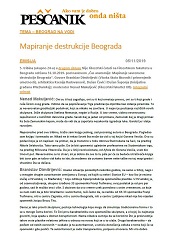
5. tribina (ukupno 24-a) u drugom ciklusu Nije Filozofski ćutati na Filozofskom fakultetu u Beogradu održana 31.10.2019. pod naslovom „Čas anatomije: Mapiranje savremene destrukcije Beograda“. Govore Branislav Dimitrijević (Visoka škola likovnih i primenjenih umetnosti), arhitektica Ksenija Radovanović, Dušan Čavić i Dušan Šaponja (Inicijativa građana #NeDamKej); moderator Nenad Makuljević (Filozofski fakultet UB).
More...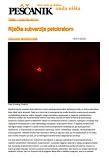
Među brojnim stvarima koje dijelimo u ovim postjugoslavenskim državama ističe se jedna zakonitost koja nikad neće omanuti. Radi se o tome da je nemoguće da prođe dovoljno vremena od raspada socijalističkog sistema, nakon kojeg bi mogli racionalno razgovarati o njegovim prednostima i manama, budući da nacionalistički histerici koji bdiju nad žarom kontrarevolucije pokušavaju zaustaviti vrijeme putem simboličkih ratova te nametanja cenzura i zabrana, nastojeći u krajnjoj liniji uspostavit totalitarizam u vidu ideološkog monopola i zabranjenih tema. O logičkoj neodrživosti takvog pristupa u kojem ti s jedne strane smeta socijalističko razdoblje jer ga ocjenjuješ kao totalitarno, a istovremeno bi zabranjivao memoriju, teme i simboličko nasljeđe, nema pretjerano smisla govoriti. Jednako onima koji razumiju o čemu je zapravo riječ, pa im objašnjenje ni ne treba, kao i ovima o kojima je riječ, jer je nemoguće da bilo kakvo objašnjenje razumiju.
More...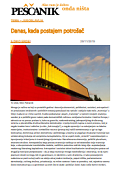
Mnogo je načina na koji su proteklih godina i decenija ekonomisti, politikolozi, sociolozi, antropolozi i ini proučavaoci društvenih i političkih kretanja pokušavali da razluče i zaključe kako teče „tranzicija“ u Srbiji i kada će se i čime završiti. Kratko podsećanje: pojam „tranzicije“ u njenom novijem značenju uveden je u politički govor nakon pada komunističkih režima u zemljama Centralne i Istočne Evrope, i odnosio se na proces prelaza iz, kako se govorilo, nedemokratskog jednopartijskog društvenog sistema u pluralistička društva liberalne demokratije. U polju brojnih napisa o ovom procesu, koji je negde izveden brzo i odlučno (u vidu „šok terapije“), a negde opreznije i sa oslanjanjem na lokalne materijalne, institucionalne i simboličke resurse (pristup koji naliči kombinovanju u igri sa lego kockicama), dominiraju prilozi ekonomista i politikologa u kojima se angažuje shvatanje tranzicije kao unilateralnog kretanja od socijalizma ka kapitalizmu, čiji se uspeh može „izmeriti“ napredovanjem u ispunjavanju kriterijuma iz tranzicijskog trijumvirata: liberalizovana ekonomija, politički pluralizam, otvoreno društvo. Antropološka ideja procesa tranzicije razlikuje se od teleološke vizije tranzicije koja, u oba pomenuta tranzitološka modela, različitim putevima vodi do istog cilja: uspostavljanja modernog liberalnog kapitalizma. Antropolozi i sociolozi skloni kvalitativnim istraživanjima polaze od drugačije teorijske pretpostavke – da je ideja tranzicije mnogo neodređenija i otvorenija, te da njeni planirani ishodi ne mogu biti ni garantovani, ni identični u svim društvima. U tako postavljenim radovima se prati na koji način se odvija uticaj makro institucija, poput tržišta, parlamentarne demokratije, civilnog društva, privatizacije, na mikro svetove i kako se porodica, rad, zajednica veoma često restrukturiraju u suprotnosti sa onim što bi vlade i političari želeli. Kako ističe Ketrin Verderi, jedna od najuglednijih antropološkinja koja se upustila u istraživanje i objašnjavanje ovog procesa, transformacija bivših socijalističkih društava u poslednjoj deceniji 20. veka „će stvoriti niz raznih oblika, od kojih će neki možda biti sličniji kapitalističkim ekonomijama, a mnogi neće“. U tom smislu, antropolozi će nerado govoriti o „fazama“ ili „završetku tranzicije“, kao što će, uostalom, predložiti da se umesto ideološki kodiranog pojma „tranzicija“, za proces političkih, ekonomskih, društvenih i kulturnih promena koje su nastupile u bivšim socijalističkim društvima nakon pada Berlinskog zida, koristi pojam „društvena transformacija“.
More...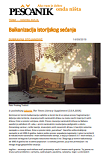
Kontroverzni termin balkanizacija najčešće se koristi da bi se opisao proces fragmentacije i deljenja neke teritorije, stvaranja malih nacionalnih država na mestu starih imperija ili većih država, čime se prostor usitnjava, drobi. Proces stvaranja nacionalnih država na Balkanu započet je početkom 19. veka, s prvim nacionalnim revolucijama podignutim u okviru Osmanskog carstva i, nešto kasnije, stvaranjem prvih nezavisnih država. U kasnijim ratovima nastajale su nove države, čime se prostor dalje „parcelisao“. Naročito veliko drobljenje nastupilo je od 1990-ih godina, kada je počeo proces raspadanja Jugoslavije i ratovi na teritoriji te nekada multi nacionalne i multi konfesionalne zemlje, iz koje je nastalo 6 ili 7 novih država, u zavisnosti od toga da li priznajete nezavisnost Kosova ili ne. Zbog toga je termin balkanizacija od 1990-ih godina bio izuzetno popularan i u svetskoj javnosti, pa je bio primenjivan i na mnoge druge geopolitičke situacije.
More...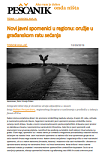
Nakon sloma socijalizma dolazi i do promene simboličkog kapitala sećanja. Krajem 20. veka, od kada je nacionalno potisnulo klasno, hegemoni nacionalni javni spomenici postaju simbolička mesta sećanja novih država. Svuda u novim renacionalizovanim poslesocijalističkim državama javni prostor se obeležava crkvama i spomenicima nacionalnim ličnostima. Zato što je javni spomenik uvek skamenjeni izraz grupnog pijeteta, naročita žrtva podneta za kolektiv traži redovni ritual sećanja na grobu. Osim toga, spomenici su i mesta utehe jer simbolišu mogućnost prevazilaženja vlastitih zločina sećanjem na vlastite žrtve. Javni nacionalni spomenici su daleko više izraz spremnosti grupe da se seća vlastitih žrtava nego vlastite krivice. Nakon sloma socijalizma i Jugoslavije dižu se novi nacionalni spomenici, ali se u nekim delovima (Hrvatska, Kosovo) i masovno ruše stari multietnički. Ubrzano su uprostoravana sećanja na nacionalne žrtve i na žrtve komunizma. Nove države i nove sisteme vrednosti trebalo je snabdeti i monumentalnim spomeničkim simboličkim kapitalom. Da bi se to uverljivije pokazalo, dizanje spomenika žrtvama iz građanskog rata 1990-ih svuda sinhrono prati traganje za žrtvama komunističkog nasilja. Ovaj prilog je osvrt na nove spomenike kao na važna oružja u savremenom građanskom ratu sećanja u regionu.
More...
Poslednjih godina u Evropi je učestala praksa donošenja zakona koji propisuju narative o prošlosti, kojima se uspostavljaju „zvanična sećanja“, navodno po uzoru na zakone o zabrani poricanja Holokausta. Međutim, ispostavilo se da se ova nova vrsta propisivanja ispravnog govora o prošlosti može iskoristiti za razne vrste „pranja istorije“ i nametanje jednog i jedinog odobrenog mišljenja. Tu spada i kontroverzna Rezolucija Evropskog parlamenta o evropskoj svesti i totalitarizmu, kojom su 2009. godine u isti paket stavljeni fašizam, nacizam i komunizam. Ovo je pokrenulo velike debate i čitav pokret istoričara pod nazivom Sloboda za istoriju. Najveća istoriografska imena okupila su se oko ideje da je svako propisivanje istorijskih narativa u suštini ograničavanje slobode naučnog istraživanja i nametanje trenutnih ideoloških opredeljenja, što je suprotno principima slobode misli i izražavanja.
More...
Jugoslovenstvo je jedna od mnogih „nesrećnih“ tema srpske istoriografije. Njeno postojanje u fokusu naučnika bilo je, uglavnom, određeno političkim razlozima. To bi se lako moglo dokazati već kvantitativnom analizom istoriografske produkcije. Tokom postojanja dve jugoslovenske države, dok je jugoslovenstvo bilo državna ideologija, istraživanje tog fenomena bilo je forsirano, a potraga za njegovim korenima bila je gotovo obavezna naučna disciplina i tema. U potrazi za korenima Jugoslavije istoričari su odlazili sve dublje u prošlost, sežući, s mnogo razloga, do Prosvetiteljstva. Budući da je u to vreme studijama prošlosti metodološki prevladavala politička istorija, koreni Jugoslavije nalaženi su u političkim idejama intelektualne, pa zatim i političke elite, u njenim proklamovanim ili neproklamovanim projektima i programima, u izjavama, deklaracijama, državnim „smernicama“…
More...
Da li je unisona osuda potpisnika Deklaracije o zajedničkom jeziku dovoljna? Je li time dovršen obračun s Jugoslavenima u Hrvatskoj? Naravno da nije. Hrvatska intelektualna zajednica, istina, kvalitetnom je harangom reagirala na tu provokaciju – na stranu što bi spomenutu bagru valjalo goniti i sudskim putem, po zakonima prijeke prirode – no time opasnost od jugoslavenstva nije ni izbliza suzbijena. Jer osim javnih, postoje i privatne – dakle tajne – manifestacije devijantnih ponašanja. Što je, primjerice, s onim građanima Hrvatske koji Deklaraciju nisu potpisali, a sjećaju se Jugoslavije u povoljnijem svjetlu nego što je to podnošljivo? Takvima zasad ne uspijevamo ni ući u trag.
More...
U ove četiri države, u Hrvatskoj, Srbiji, Bosni i Hercegovini i Crnoj Gori vlada nacionalizam. Nacionalističkim elitama je jako stalo da kroz škole i medije usađuju u populaciju takvu priču o prošlosti koja bi opravdala i čak učinila naizgled neminovnim ono što je u interesu vladajućih. Cilj im je, preko onoga što predočavaju kao povijest, cementirati nacionalističku ideologiju. Pritom se koriste dvije glavne strategije: jedna je stalno ponavljanje neistina, a druga je prešućivanje bitnih činjenica. Te strategije presudno obilježavaju prikazivanje naše jezične prošlosti. Kako to u praksi izgleda, o tome će sada biti riječi.
More...
Nije reč samo o konceptu francuskog istoričara Pjera Nora o mestima gde se, po dogovoru ili protiv njega, neguje sećanje na neki događaj važan za kolektivnu istoriju: reč je i o mestu sećanja u svim oblicima, dakle i ličnih, u ispisivanju prošlosti u kulturi i svakodnevnoj politici, i korigiranju tog ispisivanja u skladu sa istorijom i njenim istraživanjima i zaključcima. Kada se lično sećanje, kome nije dato da se oblikuje kao kolektivno zbog političke utilitarnosti bilo kojeg tipa, grubo deformiše i groteskno menja dok su još živi njegovi nosioci, nastaje ozbiljan problem. I naravno, najgore je kada se brlja sa „starim“ sećanjem, onim koje ima potporu ne samo u državnim feštama i ideološkim saobraćajnim znacima, nego upravo u ličnom i svakodnevnom.
More...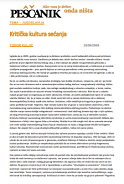
Izgleda da je 2005. godine suočavanje sa bliskom prošlošću novih balkanskih država pod pritiskom izvana dobilo nove tonove. Zaoštrena je debata oko ratnih zločina unutar i između država. Hrvati grčevito brane dignitet Domovinskog rata, a Srbi nastoje da ublaže neuporedivost genocida u Srebrenici ističući i ostale zločine. Domovinski rat se ne smije kriminalizovati, a Srebrenica je rezultat smišljene propagande – jesu parole kojima se umiruje povređeno vrelo ponosnog nacionalnog osećanja običnog čoveka. Ne manje je upadljiva retorika po kojoj su se svi branili od agresije, a ako je i bilo preterivanja, reč je o ekscesima.
More...
Rušenje Lenjinovih spomenika postalo je uobičajena televizijska ilustracija izveštaja o masovnim protestima u Kijevu protiv Janukovičeve vlade. Bio je to lak način za demonstraciju besa: spomenici su predstavljali simbol sovjetske represije i politike ruske dominacije nad susedima čijim se nastavljačem smatra Putinova Rusija.
More...
Putinov prelazak na otvoreno hitlerovsku spoljnu politiku kvalitativno menja političku konfiguraciju unutar zemlje. Pre svega, s dnevnog reda je definitivno skinut projekat „ujedinjene antiputinske opozicije“. Putin je, onako skoro sasvim po hitlerovski, uzjahao „postversajski sindrom“, raspalio masovnu imperijalno-šovinističku psihozu i pridobio značajnu većinu onih koji podržavaju agresivnu politiku koju je on započeo. Na njegovu stranu je dobrim delom stala i opozicija, naravno dumska, ali ne samo ona.
More...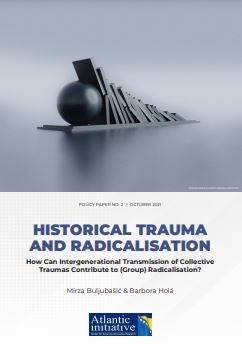
In this paper, we attempt to build upon existing theoretical and empirical knowledge stemming from criminology, conflict and peace studies, and radicalisation/extremism studies, among others, in order to explore the (potential) role of historical trauma in (collective/group) radicalisation. Historical trauma is objective, altered, or imagined trauma that occurred in the (more or less distant) past and is shared by a group of people (i.e., is one of the markers of their group identity across generations). Radicalisation refers to a process of acquiring more and more extreme political, religious, or social ideologies, and becoming more prone to endorsing any form of (violent) extreme behaviour to achieve one’s goals. The intergenerational transmission of collective trauma can arguably have a significant role in the radicalisation of future generations who consider themselves historically victimized by “the Other”. The aim of this paper is to explore how the intergenerational transmission of collective trauma may contribute to (group) radicalisation. The paper, therefore, introduces a (thus far relatively neglected) intergenerational perspective in radicalisation studies. In order to do so, we first briefly address the existing knowledge on individual and collective radicalisation. Thereafter, we discuss individual and collective trauma and describe their consequences and manifestations. Then, we turn the attention to scholarship on the intergenerational transmission of the legacies of political violence, focusing in particular on the intergenerational transmission of collective trauma, i.e., historical trauma. The final section synthesizes our arguments and makes a couple of (tentative) claims on how historical trauma can potentially contribute to the radicalisation of present and future generations. This paper does not present conclusive evidence nor policy recommendations. Its main aim is to open new doors for further discussions and the future exploration of (violent) radicalisation, trauma, and their intergenerational consequences.
More...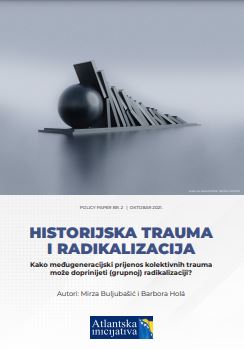
U ovom radu, nastojimo se oslanjati na postojeće teorijsko i empirijsko znanje - koje proizilazi, između ostalog, iz kriminologije, studija sukoba i mira i studija radikalizacije/ekstremizma - s ciljem ispitivanja (potencijalne) uloge historijske traume u (kolektivnoj/grupnoj) radikalizaciji. Historijska trauma je objektivna, izmijenjena ili zamišljena trauma koja se desila u (daljoj ili bližoj) prošlosti i koju dijeli određena grupa ljudi (odnosno, koja predstavlja jedan od markera njenog grupnog identiteta kroz generacije) kroz generacije. Radikalizacija se odnosi na proces u kojem osoba postaje sve ekstremnija u političkim, vjerskim ili društvenim ideologijama, te podložnija prihvatanju bilo kojeg oblika (nasilnog) ekstremnog ponašanja da bi postigla svoje ciljeve. Međugeneracijski prijenos kolektivne traume može nesumnjivo imati značajnu ulogu u radikalizaciji budućih generacija grupa koje smatraju da ih “Drugi“ historijski viktimizira. Cilj ovog rada je istražiti kako međugeneracijski prijenos kolektivne traume može doprinijeti (grupnoj) radikalizaciji? U ovom radu se stoga uvodi (do sada relativno zanemarena) međugeneracijska perspektiva u studije radikalizacije. U tu svrhu, trebamo se prvo kratko osvrnuti na postojeće znanje o pojedinačnoj i kolektivnoj radikalizaciji. Nakon toga, govorimo o pojedinačnoj i kolektivnoj traumi i opisujemo njene posljedice i pojavne oblike. Pažnju onda skrećemo na međugeneracijski prijenos nasljeđa političkog nasilja, sa posebnim fokusom na međugeneracijski prijenos kolektivne traume, odnosno historijske traume. Posljednji dio daje sintezu naših argumenata i predstavlja nekoliko (okvirnih) tvrdnji o tome kako historijska trauma potencijalno može doprinijeti radikalizaciji današnjih i budućih generacija. U ovom radu se ne izlažu konačni dokazi niti ultimativne preporuke za politiku. Glavni cilj rada je da otvori nove prostore za dalje rasprave i buduća istraživanja (nasilne) radikalizacije, traume i njenih međugeneracijskih posljedica
More...